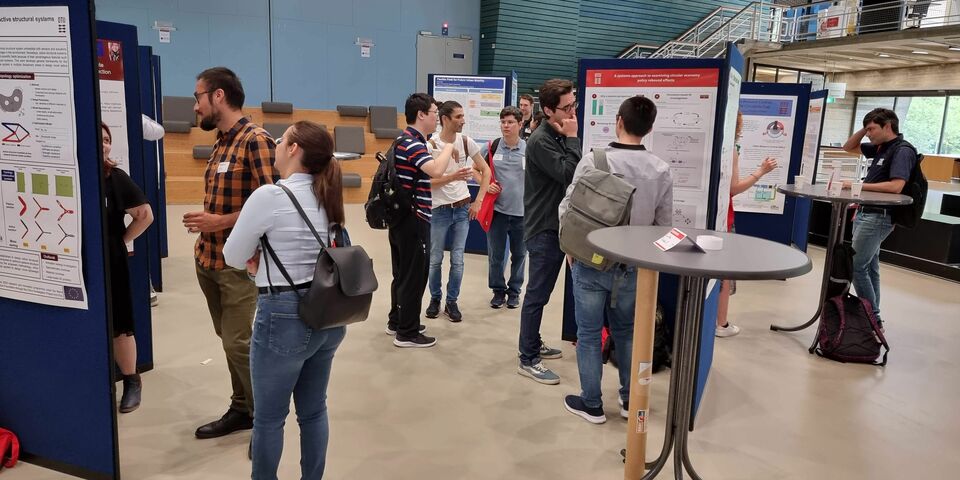EuroTech postdocs attend bootcamp in Eindhoven
The ‘fine fleur of the up-and-coming generation of young researchers’ is visiting Eindhoven this week for a boot camp organized by the second postdoc program of the EuroTech Universities Alliance, which is led by TU/e. The thirty postdocs, each admitted to the program after a strict selection process, will participate in various practical and – hopefully – inspiring workshops together and will also have ample opportunity to get to know each other better.
On Tuesday, the fourth floor of the Klok building was buzzing with animated conversations, conducted in English with a wide range of international accents. The lunch break splits this day’s workshop – ‘Street combing’ – into two parts. After an introduction by course leader Richard Stomp (author of the book ‘Straatjutten’), the postdocs take to the streets in twos to draw inspiration from their surroundings. After the break, the photographs they took are discussed ‘en groupe’.
The idea behind the workshop is that a traditional brainstorming session – in which groups of people spout as many ideas as possible – doesn’t really work that well. People come up with better ideas on their own, as long as they can be inspired by their surroundings. Strijp-S, the trendy former industrial area that used to be owned by Philips, proved to be the ideal location for this kind of inspiration. And it helps that there happens to be a vehicle – probably used in the construction of the apartment building next to the Klok building – dangling from a gigantic crane tens of meters up in the air. An unexpected place for a car, the participants agree. This may offer some starting points for the creative thought process.
Text continues below photo
The bootcamp, which for the most part takes place on TU/e’s campus, is organized by policy officer Willem van Hoorn and program manager Ingrid Vliegen of the EuroTechPostdoc2 Program. Of the thirty-five postdocs who joined this batch of the program last year, thirty are present. “The other five had important conferences this week that they didn’t want to miss”, Van Hoorn says. “These people represent the ‘fine fleur’ of the up-and-coming generation of researchers. They had to submit research proposals to secure a postdoc position within this program and were selected out of nearly three hundred applicants.”
The EuroTech postdocs have acquired a two-year appointment at the Technical University of Denmark (DTU), Technical University of Munich (TUM), École Polytechnique (L'X) in Paris or at TU/e. In addition, they spend some time at one of the other partner universities of the EuroTech Universities Alliance. Among them are École Polytechnique Fédérale de Lausanne (EPFL) and Israel Institute of Technology (Technion) in Haifa.
Freedom
“This is the first bootcamp for the current batch”, program manager Vliegen explains. “Next year, there will be another bootcamp for them in Denmark. The bootcamps for the next batch of 35 postdocs will be organized in Munich and Paris.” Within the postdoc program, there is a lot of focus on training, she says. “There’s a personal development plan for each participant, in which they’re allowed a great deal of freedom to set their own priorities.” That freedom is intrinsic to the program, Van Hoorn adds: “Postdocs are often appointed within existing research projects, which automatically creates limitations; because the postdocs in this program have written their own proposals, they also have more freedom to make their own choices.”
Anke van Oosterhout is the only Dutch participant in the bootcamp. This is not surprising, since most of the candidates for the postdoc program were recruited outside of Europe – they come from China, India, Brazil and Cuba, among other countries. In addition, the postdocs may not have resided in the country of their host university for more than one year in the three years prior to their appointment. “It’s partly funded by the EU’s Marie Curie program”, explains Vliegen. “In that program, there’s an emphasis on the mobility of scientists.”
Haptic feedback
However, Van Oosterhout, an alumna of TU/e’s Industrial Design program, obtained her doctorate in Denmark and thus qualified for a spot as a EuroTech postdoc at TU/e – a position she shares with nine foreign colleagues. Her research focuses on the possibilities of using so-called haptic feedback for users’ interaction with smart technology. “I once designed a thermostat knob that would offer resistance if you tried to turn it up too high; that might be a way to get people to make more sustainable choices”, she gives as an example.
Next year, she intends to go to Lausanne for three months for her ‘secondment’. “There’s a very technical group based there that works on modular robots and uses all kinds of special new materials. I hope to find inspiration there to make more aesthetic and user-friendly designs.”
Networking
The participants come from a wide variety of disciplines. Still, the networking aspect of the bootcamp is important, Vliegen emphasizes. “For many European projects, it’s even a requirement to collaborate with people from outside your field.” Postdoc Van Oosterhout, against her own expectations, has already identified interesting links with the research topics of her colleagues present: “I’ve already spoken to several people who are involved in material science and robotics, so I can definitely make interesting connections here.”



Discussion